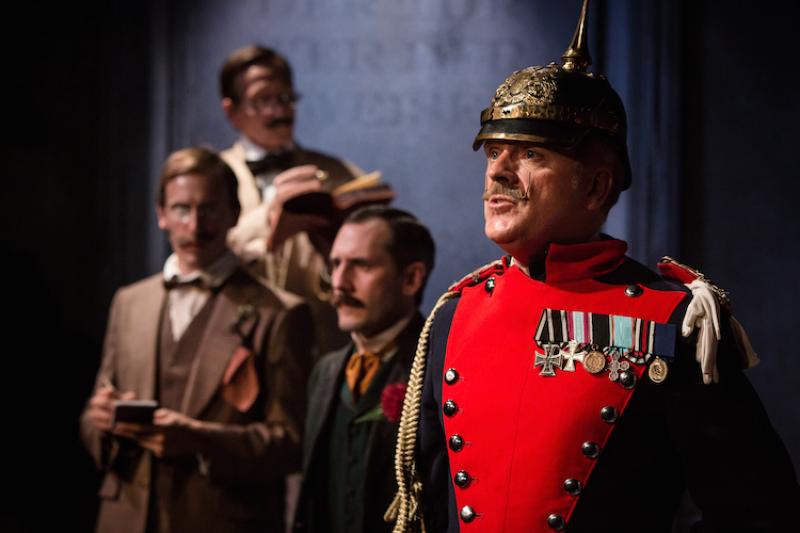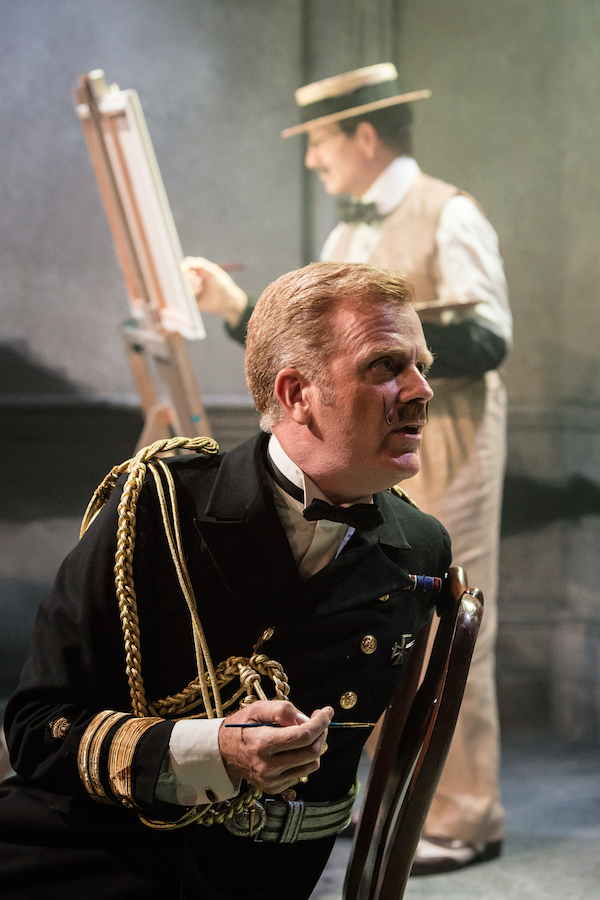Sommer 14 - A Dance of Death, Finborough Theatre | reviews, news & interviews
Sommer 14 - A Dance of Death, Finborough Theatre
Sommer 14 - A Dance of Death, Finborough Theatre
A new German play offers an incendiary view on the root causes of global war

For those who have spent the past few months nodding along to World War I conversations while desperately trying to remember who killed that archduke and why, Rolf Hochhuth has kindly supplied a solution in the form of a dramatised European history lesson, making its English-language premiere at the Finborough.
But beware: this beneficence requires payment in kind. Controversial German playwright Hochhuth is feverishly devoted to his distorted viewpoint, and he won’t be satisfied until he has ground you into submission. Thus his “documentary theatre” is spiced up with a liberal helping of bias, conjecture and flat-out invention, which makes the project’s lofty aims somewhat dubious, but undoubtedly lends a certain piquancy to his central hypothesis.
 The sprawling epic’s vignettes depict key events in the build-up to war. They all feed into the conclusion that conflict was neither inevitable nor necessary, but cynically engineered by those in authority. Hochhuth, hindsight lending him a cosy smugness, derisively condemns leaders he feels were driven by political or financial gain, saving particular vitriol for that nefarious, moustache-twirling Bond villain Winston Churchill, apparently motivated by weapons manufacturers’ profit margins. It’s riveting polemic, but Hochhuth fails to extend the same empathy to the powerful that he demands for those combatants and civilians who died in their millions.
The sprawling epic’s vignettes depict key events in the build-up to war. They all feed into the conclusion that conflict was neither inevitable nor necessary, but cynically engineered by those in authority. Hochhuth, hindsight lending him a cosy smugness, derisively condemns leaders he feels were driven by political or financial gain, saving particular vitriol for that nefarious, moustache-twirling Bond villain Winston Churchill, apparently motivated by weapons manufacturers’ profit margins. It’s riveting polemic, but Hochhuth fails to extend the same empathy to the powerful that he demands for those combatants and civilians who died in their millions.
These didactic snapshots are thankfully contained within an effective Danse Macabre framework, with Death acting as our all-singing, all-dancing emcee. Newcomer Dean Bray (pictured right) is one to watch, here a scathing, intense figure railing against “extinction by heavy industry” in two devastating World Wars; surely the next will be total apocalypse, he challenges. It’s a chilling vision given the recent deployment of nuclear bombs and mechanical drones, and injects much-needed topical urgency into scenes that are otherwise dramatically inert. Even if we didn’t know where the action was headed, Hochhuth takes pains to remind us, placing suspiciously spot-on predictions into the mouths of his characters. Subtle it is not.
 Consequently, several scenes are purely informative, including Emperor Franz Joseph and King Edward VII discussing the danger posed by Kaiser Wilhelm II, German politicians leaking dubious intelligence, and a peacenik French minister's wife murderously confronting an editor. In Gwynne Edwards’ accessible free adaptation, there are a few that offer emotional complexity. Particularly moving are Andrea Hart as a German scientist tormented by the development of chemical warfare, Sarah-Jayne Butler’s Lusitania victim, and Peter Cadden and Henry Proffit’s anxious Serbian conspirators. Nick Danan has fun with Churchill as a young firebrand, as does Hart playing his glamorous American mother, and Tim Faulkner is magnificent as capricious, art-loving zealot Kaiser Wilhelm (pictured left).
Consequently, several scenes are purely informative, including Emperor Franz Joseph and King Edward VII discussing the danger posed by Kaiser Wilhelm II, German politicians leaking dubious intelligence, and a peacenik French minister's wife murderously confronting an editor. In Gwynne Edwards’ accessible free adaptation, there are a few that offer emotional complexity. Particularly moving are Andrea Hart as a German scientist tormented by the development of chemical warfare, Sarah-Jayne Butler’s Lusitania victim, and Peter Cadden and Henry Proffit’s anxious Serbian conspirators. Nick Danan has fun with Churchill as a young firebrand, as does Hart playing his glamorous American mother, and Tim Faulkner is magnificent as capricious, art-loving zealot Kaiser Wilhelm (pictured left).
Christopher Loscher, with help from Mike Lees’ versatile design, maintains a brisk pace without sacrificing clarity and makes excellent use of projections, which offer ghostly reminders of the shattering consequences of these encounters. “Everyone fights with the weapons they have,” asserts the editor soon to find himself on the wrong end of a pistol, and Hochhuth has certainly deployed all of his weapons in this combative, fiercely ideological pageant.
rating
Explore topics
Share this article
The future of Arts Journalism
You can stop theartsdesk.com closing!
We urgently need financing to survive. Our fundraising drive has thus far raised £49,000 but we need to reach £100,000 or we will be forced to close. Please contribute here: https://gofund.me/c3f6033d
And if you can forward this information to anyone who might assist, we’d be grateful.

Subscribe to theartsdesk.com
Thank you for continuing to read our work on theartsdesk.com. For unlimited access to every article in its entirety, including our archive of more than 15,000 pieces, we're asking for £5 per month or £40 per year. We feel it's a very good deal, and hope you do too.
To take a subscription now simply click here.
And if you're looking for that extra gift for a friend or family member, why not treat them to a theartsdesk.com gift subscription?
more Theatre
 Dracula, Lyric Hammersmith review - hit-and-miss recasting of the familiar story as feminist diatribe
Morgan Lloyd Malcolm's version puts Mina Harkness centre-stage
Dracula, Lyric Hammersmith review - hit-and-miss recasting of the familiar story as feminist diatribe
Morgan Lloyd Malcolm's version puts Mina Harkness centre-stage
 Reunion, Kiln Theatre review - a stormy night in every sense
Beautifully acted, but desperately grim drama
Reunion, Kiln Theatre review - a stormy night in every sense
Beautifully acted, but desperately grim drama
 The Code, Southwark Playhouse Elephant review - superbly cast, resonant play about the price of fame in Hollywood
Tracie Bennett is outstanding as a ribald, riotous Tallulah Bankhead
The Code, Southwark Playhouse Elephant review - superbly cast, resonant play about the price of fame in Hollywood
Tracie Bennett is outstanding as a ribald, riotous Tallulah Bankhead
 The Lady from the Sea, Bridge Theatre review - flashes of brilliance
Simon Stone refashions Ibsen in his own high-octane image
The Lady from the Sea, Bridge Theatre review - flashes of brilliance
Simon Stone refashions Ibsen in his own high-octane image
 Romans: A Novel, Almeida Theatre review - a uniquely extraordinary work
Alice Birch’s wildly epic family drama is both mind-blowing and exasperating
Romans: A Novel, Almeida Theatre review - a uniquely extraordinary work
Alice Birch’s wildly epic family drama is both mind-blowing and exasperating
 The Producers, Garrick Theatre review - Ve haf vays of making you laugh
You probably know what's coming, but it's such great fun!
The Producers, Garrick Theatre review - Ve haf vays of making you laugh
You probably know what's coming, but it's such great fun!
 Not Your Superwoman, Bush Theatre review - powerful tribute to the plight and perseverance of Black women
Golda Rosheuvel and Letitia Wright excel in a super new play
Not Your Superwoman, Bush Theatre review - powerful tribute to the plight and perseverance of Black women
Golda Rosheuvel and Letitia Wright excel in a super new play
 Cow | Deer, Royal Court review - paradox-rich account of non-human life
Experimental work about nature led by Katie Mitchell is both extraordinary and banal
Cow | Deer, Royal Court review - paradox-rich account of non-human life
Experimental work about nature led by Katie Mitchell is both extraordinary and banal
 Deaf Republic, Royal Court review - beautiful images, shame about the words
Staging of Ukrainian-American Ilya Kaminsky’s anti-war poems is too meta-theatrical
Deaf Republic, Royal Court review - beautiful images, shame about the words
Staging of Ukrainian-American Ilya Kaminsky’s anti-war poems is too meta-theatrical
 Laura Benanti: Nobody Cares, Underbelly Boulevard Soho review - Tony winner makes charming, cheeky London debut
Broadway's acclaimed Cinderella, Louise, and Amalia reaches Soho for a welcome one-night stand
Laura Benanti: Nobody Cares, Underbelly Boulevard Soho review - Tony winner makes charming, cheeky London debut
Broadway's acclaimed Cinderella, Louise, and Amalia reaches Soho for a welcome one-night stand
 The Pitchfork Disney, King's Head Theatre review - blazing with dark energy
Thrilling revival of Philip Ridley’s cult classic confirms its legendary status
The Pitchfork Disney, King's Head Theatre review - blazing with dark energy
Thrilling revival of Philip Ridley’s cult classic confirms its legendary status
 Born with Teeth, Wyndham's Theatre review - electric sparring match between Shakespeare and Marlowe
Rival Elizabethan playwrights in an up-to-the-minute encounter
Born with Teeth, Wyndham's Theatre review - electric sparring match between Shakespeare and Marlowe
Rival Elizabethan playwrights in an up-to-the-minute encounter

Add comment